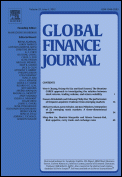
Global Finance Journal
Scope & Guideline
Elevating discourse in finance and economics.
Introduction
Aims and Scopes
- Corporate Finance and Governance:
Research on corporate governance structures, executive compensation, and the impact of managerial decisions on firm performance and risk. - Sustainable Finance and ESG:
Exploration of environmental, social, and governance (ESG) factors in investment decisions, corporate behavior, and regulatory frameworks. - Market Dynamics and Financial Instruments:
Studies examining the behavior of various financial markets, including stock, bond, and cryptocurrency markets, as well as the development and impact of financial instruments. - Risk Management:
Analysis of risk factors affecting financial institutions and markets, including macroeconomic risks, climate risks, and financial technology risks. - Digital Finance and FinTech:
Investigation into the role of financial technology in enhancing market efficiency, improving access to finance, and transforming traditional banking and investment practices. - International Finance:
Research on cross-border financial flows, currency markets, and the implications of international trade and investment policies on financial systems. - Behavioral Finance:
Examination of psychological factors and market sentiment that influence investor behavior and decision-making processes.
Trending and Emerging
- Climate Finance and Risk Management:
A significant increase in studies addressing climate risk and its implications for corporate finance and investment strategies, reflecting a growing awareness of sustainability in financial decision-making. - Digital Transformation and Financial Technology:
Emerging research on the impact of digital transformation on financial markets and institutions, with a focus on FinTech innovations, digital currencies, and their regulatory implications. - Interconnectedness of Global Markets:
An increasing trend in analyzing the interconnectedness of various financial markets, including the effects of geopolitical events and economic policies on global financial stability. - Behavioral Insights in Finance:
A rise in the exploration of behavioral factors influencing investment decisions, market sentiment, and risk perceptions, highlighting the importance of psychological elements in finance. - Diversity and Inclusion in Corporate Governance:
Emerging studies focusing on gender diversity and inclusion in corporate governance, examining their impact on firm performance, decision-making, and stakeholder engagement. - Financial Inclusion and Access to Capital:
Growing interest in research addressing financial inclusion, particularly in emerging markets, and how access to finance affects economic development and individual well-being.
Declining or Waning
- Traditional Banking Practices:
Research addressing conventional banking practices and their operational efficiency has become less frequent, as the focus shifts towards digital finance and innovative banking solutions. - Historical Financial Crises Analysis:
Papers specifically analyzing past financial crises for historical insight are declining, indicating a potential shift towards forward-looking studies that address current and future financial challenges. - Localized Economic Studies:
Studies focused solely on localized economic phenomena without a global or comparative perspective are waning, as the journal increasingly emphasizes international and cross-border financial analysis. - Static Risk Assessment Models:
There is a noticeable decrease in the use of static risk assessment models, as dynamic and adaptive models that account for real-time changes in the financial landscape gain more traction. - Traditional Stock Valuation Techniques:
Research specifically centered on traditional stock valuation methods and models is becoming less common, with newer approaches that integrate behavioral and technology-driven insights taking precedence.
Similar Journals
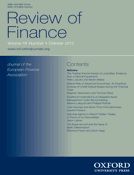
Review of Finance
Pioneering high-quality research in finance and beyond.The Review of Finance, published by Oxford University Press, stands as a premier academic journal in the fields of Finance, Accounting, and Economics. With an ISSN of 1572-3097 and an impressive track record stretching from 2001 to 2024, this journal is consistently recognized for its high-quality research, reflected in its Q1 rankings across key categories, including Accounting, Finance, and Economics and Econometrics. The Review of Finance is dedicated to advancing the understanding of financial phenomena through robust empirical and theoretical insights, making it an essential resource for researchers and professionals alike. Additionally, its strong Scopus rankings, placing it in the top percentiles, highlight its influence and relevance in ongoing academic discourse. Although the journal is not open access, it remains widely accessible through academic institutions, ensuring that its valuable contributions reach an extensive audience. The editorial board invites submissions that promise to further engage the academic community in the dynamic intersections of finance, accounting, and economic research.

Finance Research Letters
Pioneering insights in the ever-evolving finance landscape.Finance Research Letters, published by Academic Press Inc Elsevier Science, is a leading journal in the field of finance, recognized for its exceptional impact as indicated by its Q1 ranking in the Finance category of the Scopus Index, placing it in the top 6% of journals in this area. With an ISSN of 1544-6123 and an E-ISSN of 1544-6131, this journal has been a crucial platform for disseminating cutting-edge research since its inception in 2004. It covers a wide array of topics within finance, including but not limited to portfolio management, risk assessment, and financial innovation, making it an invaluable resource for researchers, professionals, and students committed to advancing their understanding of the financial sector. Although it does not currently offer open access, its contributions to the field are amplified by its impressive Scopus rank of #19 out of 317 in the Economics, Econometrics and Finance category. As the journal continues through its convergence years until 2024, it remains dedicated to publishing high-quality, peer-reviewed articles that reflect the latest trends and innovations in financial research.

European Journal of Finance
Innovating insights for tomorrow's financial leaders.European Journal of Finance is a prestigious publication specializing in the domains of finance, economics, and econometrics, published by Routledge Journals, Taylor & Francis Ltd. Established in 1995, this journal has become a vital resource for researchers, practitioners, and students, contributing significantly to the understanding of financial systems and markets. With its Q1 ranking in the Economics, Econometrics and Finance category, it stands out for its rigorous peer-reviewed articles that explore innovative theories, models, and empirical studies. The journal's impressive Scopus ranking of 35 out of 242 highlights its impact and relevance within the field, with an 85th percentile standing that underscores its importance to current financial research. Although it does not offer open access, the European Journal of Finance remains a cornerstone for those seeking to delve deeper into the complexities of finance, equipped with insights that drive both academic inquiry and practical application.
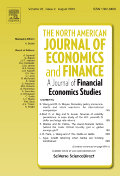
North American Journal of Economics and Finance
Uncovering insights in finance and economics.The North American Journal of Economics and Finance is a premier academic journal published by Elsevier Science Inc. since 1992, dedicated to advancing the field of economics and finance through rigorous research and scholarship. With an impressive impact factor and recognition in the Q2 category for Economics and Econometrics and Q1 for Finance as of 2023, this journal holds a significant position in the academic community, ranked #41 out of 317 in Finance and #100 out of 716 in Economics. The journal features high-quality, peer-reviewed articles that cover a broad range of topics, from theoretical frameworks to empirical analyses and practical applications. Though not an open-access platform, the journal provides valuable insights for researchers, practitioners, and students alike, promoting knowledge dissemination in the dynamic landscape of economic and financial studies. With its commitment to excellence, the North American Journal of Economics and Finance serves as an essential resource for those seeking to deepen their understanding of contemporary issues in these critical fields.
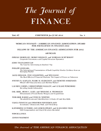
JOURNAL OF FINANCE
Shaping the future of finance through impactful research.JOURNAL OF FINANCE, published by Wiley, stands as a premier academic journal in the fields of finance, economics, and accounting. With a history dating back to 1946, the journal has consistently delivered impactful research that shapes financial theory and practice, boasting an impressive impact factor reflective of its high citation rate. Its Quartile 1 ranking in Accounting, Economics and Econometrics, and Finance illustrates its leading position within these disciplines. Although not an open access publication, the journal continues to be indispensable for researchers, professionals, and students seeking to advance their understanding and knowledge through rigorous empirical analysis and comprehensive reviews. With an esteemed global readership, the JOURNAL OF FINANCE remains committed to fostering the dissemination of innovative financial research well into 2024 and beyond.
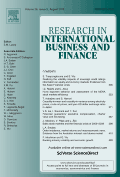
Research in International Business and Finance
Empowering research that shapes international markets.Research in International Business and Finance is a premier academic journal published by ELSEVIER, dedicated to advancing the field of international business and finance through high-quality research dissemination. With its ISSN 0275-5319 and E-ISSN 1878-3384, this journal stands out in the international research community, boasting an impressive Q1 ranking in both the Business, Management and Accounting and Finance categories for 2023. The journal aims to stimulate insightful discussions and provide a platform for innovative theories and practices from global perspectives, emphasizing empirical research and critical analysis. As it converges towards 2025, it continues to hold a prominent position in its fields, currently ranking #8 out of 189 in Business and #18 out of 317 in Finance according to Scopus. Although it does not offer open access options, the journal’s rigorous peer-review process ensures that only the most impactful research is published, making it an essential resource for researchers, professionals, and students striving for excellence in international business and finance.
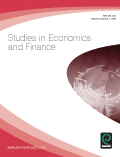
Studies in Economics and Finance
Uncovering insights for a complex financial world.Studies in Economics and Finance is a distinguished journal published by Emerald Group Publishing Ltd, based in the United Kingdom. With an ISSN of 1086-7376 and an E-ISSN of 1755-6791, this journal has been a significant contributor to the fields of economics, econometrics, and finance since its inception, with coverage ranging from 1977 to the present. Ranked in the second quartile (Q2) for 2023 in its relevant categories, it holds a reputable position within the 83rd percentile in the general economics, econometrics, and finance fields according to Scopus rankings. This journal aims to disseminate cutting-edge research that addresses key issues and emerging trends in the economic and financial landscapes, fostering dialogue among scholars, practitioners, and policymakers. Although it does not operate under an Open Access model, Studies in Economics and Finance continues to be an essential resource for advancing knowledge and providing insights that are crucial for understanding complex economic behaviors and financial systems.
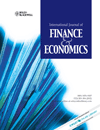
INTERNATIONAL JOURNAL OF FINANCE & ECONOMICS
Innovative Perspectives on Finance & EconomicsInternational Journal of Finance & Economics, published by Wiley, is a premier academic journal that serves as a vital resource for researchers and professionals in the fields of finance, accounting, and economics. With an impressive impact factor and a reputation for excellence, the journal is recognized in the 2023 Scopus rankings, placing in the top quartiles across multiple categories, including Q2 in Accounting, Economics, and Finance. The journal has been a significant contributor to academic discourse since its inception in 1996, with its converged years extending to 2024, thereby ensuring the continuous advancement of knowledge in these critical areas. Although it operates under a traditional subscription model, its comprehensive articles provide insightful analyses, empirical research, and theoretical advancements that cater to a diverse audience—from seasoned scholars to emerging students in the field.
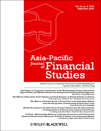
Asia-Pacific Journal of Financial Studies
Empowering Insights for Tomorrow's Financial LeadersAsia-Pacific Journal of Financial Studies is a premier academic journal published by WILEY, dedicated to advancing the field of finance within the dynamic Asia-Pacific region. With an ISSN of 2041-9945 and an E-ISSN of 2041-6156, this journal stands out for its rigorous peer-reviewed research spanning various topics in finance, making it a vital resource for researchers, practitioners, and students alike. It has achieved an impressive Q2 ranking in Finance as of 2023, placing it within the top half of finance journals as measured by its relevance and quality of contributions in the Scopus Economics, Econometrics and Finance category. Additionally, the journal supports researchers with robust access options, promoting broader dissemination of knowledge. Its dedicated focus from 2006 to 2024 highlights the journal's commitment to continuous scholarly exchange and innovation in financial studies. As it thrives in the competitive landscape of scholarly publishing, the Asia-Pacific Journal of Financial Studies not only enriches academic discourse but also informs practices that shape financial markets and policies in the region.

EMERGING MARKETS FINANCE AND TRADE
Shaping the Narrative of Finance in Developing MarketsEmerging Markets Finance and Trade is a leading academic journal published by Routledge Journals, Taylor & Francis Ltd, specializing in the dynamic field of finance and trade within emerging markets. This journal boasts an impressive impact factor and ranks in the top quartiles of its categories, attaining Q1 status in Economics, Econometrics and Finance (miscellaneous) and Q2 in Finance as of 2023. With a strong focus on innovative research, it publishes cutting-edge studies and insights that are crucial for understanding the complexities of financial systems in emerging economies. The journal, with ISSN numbers 1540-496X and 1558-0938 for its electronic version, offers a platform for both established researchers and newcomers in the field, highlighting the latest trends, policies, and challenges in finance and trade from 2002 to 2024. While it maintains a subscription-based access model, its significant contributions make it a must-read for academics, professionals, and students alike who seek to navigate and influence the rapidly evolving landscape of emerging markets.